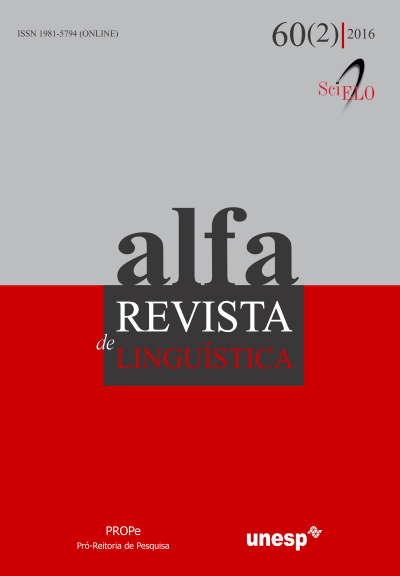The past-event memory and the event memory: a semiotic study of autobiographical genres
DOI:
https://doi.org/10.1590/1981-5794-1608-6Keywords:
Memory, Autobiographical genres, Semiotics, Tensive grammar, Enunciation, Event,Abstract
Based on the notions of field of presence and event, developed by Tensive Grammar, this study proposes two discursive types of memory as an analytical category: the past-event memory and the event memory. These discursive memory organizations determine different ways the enunciatee adheres the discourses. Being more intelligible, the former captures the enunciatee through strategies that highlight the legibility of the text, whereas the latter promotes an essentially sensitive experience. Taking such instability into account, the aim of this paper is to analyze, on the theoretical framework of discursive semiotics, the interaction between enunciator and enunciatee in different autobiographical genres. The genres studied are the literary autobiographies in prose, autobiographical poems and academic autobiographies. Each of them promotes a particular combination between the past-event memory and the event memory. It is precisely the tension between these two types of memory, these two ways of knowing the world and producing it, which seems to be the foundation of the autobiographical discourses.Downloads
Download data is not yet available.
Downloads
Published
25/08/2016
How to Cite
BARROS, M. L. P. de. The past-event memory and the event memory: a semiotic study of autobiographical genres. ALFA: Revista de Linguística, São Paulo, v. 60, n. 2, 2016. DOI: 10.1590/1981-5794-1608-6. Disponível em: https://periodicos.fclar.unesp.br/alfa/article/view/7706. Acesso em: 3 mar. 2026.
Issue
Section
Papers
License
Manuscripts accepted for publication and published are property of Alfa: Revista de Linguística. It is forbidden the full or partial submission of the manuscript to any other journal. Authors are solely responsible for the article's content. Translation into another language without written permission from the Editor advised by the Editorial Board is prohibited.

